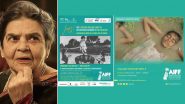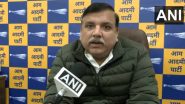New Delhi, Jan 6 (PTI) Lok Sabha Speaker Om Birla on Monday asked women representatives from Panchayati Raj Institutions (PRI) to embrace artificial intelligence (AI) and innovation in order to make their areas more "people-oriented".
Speaking at the 'Panchayat se Parliament 2.0' programme, Birla stressed the importance of technological advancements to drive sustainable development and improve governance at the grassroots level.
The event, held at the historic Central Hall of Samvidhan Sadan, was organized by the Parliamentary Research and Training Institute for Democracies (PRIDE) in collaboration with the National Commission for Women and the Ministry of Tribal Affairs.
More than 500 women PRI representatives from 22 states and Union territories participated, with the gathering serving as a platform for reaffirming India's commitment to women-led development and grassroots empowerment.
In his address, Birla underscored the transformative power of women leadership in strengthening India's democracy, emphasizing that the inclusion and empowerment of women — especially those from rural and tribal communities — are crucial for socio-economic change.
He praised the Nari Shakti Vandan Act, calling it a key step in India's progressive vision for women's leadership and a reflection of the government's commitment to fostering gender equality.
Birla also paid tribute to the 15 women members of the Constituent Assembly whose contributions continue to inspire the movement for women's empowerment.
Reflecting on India's journey over 75 years of Independence, he urged the PRI representatives to draw inspiration from icons like Rani Laxmi Bai of Jhansi and tribal leader Bhagwan Birsa Munda.
He highlighted that Munda's struggle transcended the preservation of forests and land, as he also fought to protect the dignity and self-respect of tribal communities.
“The leadership of women has been instrumental in driving change at all levels, from panchayats to Parliament, ensuring accountability and fostering inclusive development models,” Birla noted, highlighting the growing presence of women in Panchayati Raj Institutions.
He pointed out that several states have surpassed the mandated 33 per cent reservation for women, with some achieving over 50 per cent.
These milestones, he emphasized, are not just symbolic but significant steps towards sustainable governance.
Birla urged women PRI representatives to take a proactive role in women-led development and rural self-reliance.
He called 2025 a year of new resolutions, encouraging women to become self-reliant leaders, driving both social equity and economic strength.
The Lok Sabha speaker further urged them to compete among themselves to ensure progress in their communities and embrace AI, machine learning, and other innovations to make their work more "people-oriented".
During the event, Birla demonstrated Sansad Bhashini, an AI tool used for translating speeches into six Indian languages — Gujarati, Marathi, Odia, Tamil, Telugu, and Malayalam.
The tool, he explained, helps bridge language barriers and ensures more inclusive communication.
Emphasizing the importance of women's leadership in addressing rural issues such as clean drinking water, sanitation, and education, Birla also praised the entrepreneurial spirit of tribal women.
Many of them have been creating self-reliant villages through initiatives in traditional crafts, online businesses, and local production, he said.
He called for more support to ensure that these women-led enterprises reach global markets, contributing to economic growth while preserving India's rich cultural heritage.
The Speaker also highlighted the positive impact of women's leadership at the panchayat level, where sensitive and effective solutions are developed to address local challenges.
Women's personal experiences with societal difficulties, he explained, enable them to craft more robust and innovative approaches to governance.
The event also featured interactive workshops and sessions, moderated by experts and members of Parliament.
These focused on constitutional provisions related to women, with special emphasis on the 73rd Amendment and the Panchayat (Extension to Scheduled Areas) (PESA) Act, as well as government schemes addressing tribal issues.
Union Minister for Women and Child Development Annapurna Devi, Lok Sabha Secretary General Utpal Kumar Singh, and Chairperson of the National Commission for Women Vijaya Rahatkar also addressed the delegates.
(This is an unedited and auto-generated story from Syndicated News feed, LatestLY Staff may not have modified or edited the content body)













 Quickly
Quickly

















